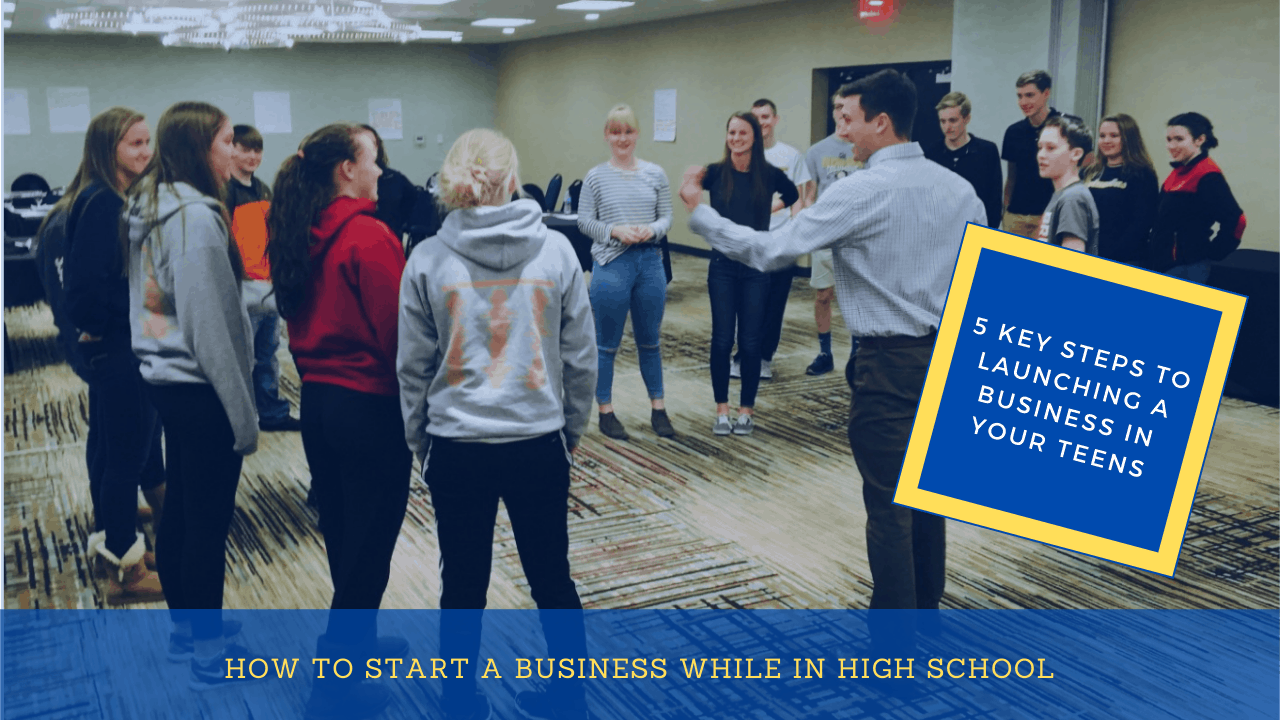How to Start a Business While in High School
5 Key Steps to Launching a Business in Your Teens
This is a guide to entrepreneurial success as a student. I think teens have the ability to start a business while in high school. People tend to underestimate the youth. It’s true. Have you read Harry Potter? Spoiler alert: no one believes him about anything, ever, even though he is literally always right. I think it’s part of the reason the Harry Potter series became so popular. That feeling is incredibly relatable for teens. They feel like no one listens, no one cares, and that their ideas aren’t good enough.
If you’re a high school student reading this, I want you to know that your ideas are good enough and that you absolutely have the ability to start your own business. It might not be easy, but the experience of working on your own business will help you immensely throughout your life. So go for it. Make it happen. As someone once told me, “People a lot dumber than you have started a business.” Not sure why, but I think about that often.
If you’re ready to get started, here are 5 keys to starting a business in high school.
1. Follow Your Whimsy
What do you love? Are there things that make you laugh or smile? What makes you zone in and lose time when you’re working on it? See if you can build a business around THAT. Usually, what brings life to you is what the world needs most.
I’ve always wanted to start a business, but when people would tell me to “Follow Your Passion” when I was in high school it felt overwhelming to me. I didn’t know what I was passionate about, and I definitely didn’t know what I wanted to pursue for the rest of my life. I think what the “Follow Your Passion” advice is missing is a sense of flexibility. When I hear, “Passion,” I feel a finality in the word; like I have to have it all figured out right now. You don’t have to have it all figured out right now.
When I tell you to follow your whimsy, I’m telling you to start something that you think has potential. Start something you might have fun working on. Don’t wait for the perfect idea. Don’t even wait until you feel like you’re fully ready. Try something out. If you hate it, you’ll be one step closer to finding what you truly are passionate about. Do something that brings you life, and funnel that positive energy into the business you start.
As one of my favorite authors, Bob Goff, wrote, “Living a life fully engaged and full of whimsy and the kind of things that love does is something most people plan to do, but along the way they just kind of forget.”
Don’t forget. Start something that brings you joy.
2. Keep Your Customer in Mind
A successful business needs customers. You need someone to purchase your product (and, unfortunately, your mom doesn’t count).
Before you spend a hundred hours creating a product, it is probably a good idea to ask some of your potential customers if they want it.
I’ve made the mistake lots of times in my businesses of building things before asking my customers if they want it. I’m sure I’ll make the mistake again. I like to create things so I can naturally put the cart before the horse. You’re going to want to get over any hesitation you have towards receiving feedback right now. Ask people if they would buy your product. If they say yes, ask them if they’d give you a down payment on it – this will show you if they’re serious about it. If they say no, ask them who they think might be interested in it. Then go ask that person if they would buy it.
Keep in mind, your customer is NOT always right. This is your business. You get to do what you think is best for it. If someone hates on your idea there might be one hundred other people who will love it. My business coach once said to me, “You can try on all the feedback you get, but in the end, you get to decide what you wear.”
3. Create a Minimum Viable Product
Imagine you are creating a product that takes weeks, maybe even months, to put together. You finally finish it, exhausted from your efforts, and you find out that people ACTUALLY wanted a very different version of what you made.
What would you do? A lot of people would just quit. You put all your hard work into building something that people didn’t end up wanting. This feeling is the worst. I’m hoping I can help you avoid that feeling.
A “minimum viable product” or MVP is a version of your product that can give you the highest amount of learning with the least amount of effort. This means that your first version of your product does not need to be a final version. Your first version should be the very start of the product so you can get feedback along the way.
If you want to create a book of your poetry, your minimum viable product might be to sell individual hand-written poems to people for $1 each (be sure to sign them; it will make them look official). Not only will this give you great feedback, it will also help you build interest in your book when it does eventually come out.
Do you have a final product in mind? What can you sell to someone tomorrow to see if your product is going to work? It’s an important question to think about.
4. Learn to Ask
There is a grittiness to starting a business that a lot of people aren’t interested in. You’ll have to build skills that may not always come naturally to you. It isn’t always a comfortable path. One skill that tends to be the hardest for young people is, “asking.”
You’ll have to ask a lot of people for a lot of things when starting a business: advice, feedback, money, sales, etc.
If you never ask for anything, it is unlikely you’ll ever get what you want. You need to overcome any fears around asking people for things.
However, there is a big difference between asking and expecting. Lots of young people burn bridges because in the midst of their “ask” is an expectation that the other person will say yes. Don’t burn bridges. If someone says, “No” chances are you might get a “Yes” later on if you thank them for their time and continue to build a relationship with them.
In business, you will hear “No.” It’s not a good feeling, but it is going to happen. You need to master the ability to bounce back from a “No.” Don’t let your successes go to your head and don’t let your failures go to your heart.
Here are some examples of good questions to ask:
- I’m working on a project, would you be willing to look it over?
- I have a product I’ve been building, would you be willing to try it out?
- Can I tell you about something I’ve been working on? I think you might be interested in it.
- What could I change about what I’m doing that would give me better results?
Ask questions often, even if you’re asking them to yourself.
5. Stick to It
When building my real estate investment business, there were about 50 moments when I said to myself, “This is when most people would quit…but I’m not going to.”
Realize that starting a business is hard work, but you can do it.
Building a business takes time and effort, but it is plausible. Ask any entrepreneur – there will definitely be bumps in the road. But if you are consistent in your effort and dedicated to your work, you will find ways to overcome the toughest of situations.
Don’t give up. Keep testing. Keep trying. Let your learning guide you.
And who knows, maybe someday I’ll be reading about your business in Forbes Magazine (online, of course).
Good luck.
—
By the way, if you do start making money with your business, you should probably know what to do with it. Here is one smart money move to make while you’re still in high school.



